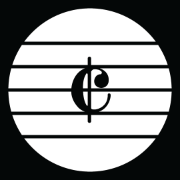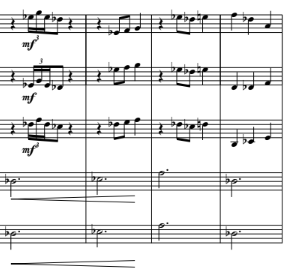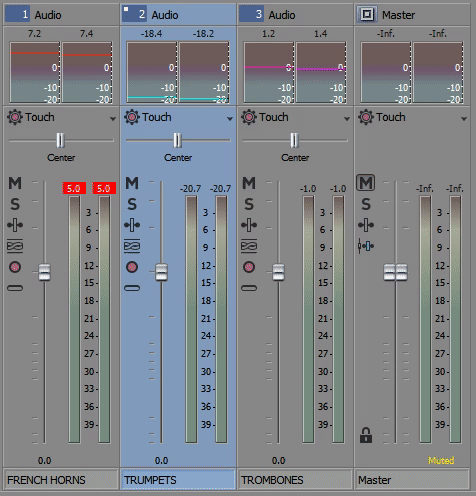All Activity
- Past hour
-
mercurypickles started following Sonata in One Movement (ca. 17')
-
Hi all! Been a while since I posted again as I've been extremely busy with both school and my writing. I'll be slowly uploading some of the pieces I've been working on over the last few months as we head on toward the summer. I hope to be much more active here over the coming months, as I'll have more time to engage with a community such as this. Anyway, this is a sonata I more or less began on a whim back in March. It is dedicated to my childhood piano and voice teacher, a close personal friend as well as someone who shaped my musicianship. She is the person that encouraged my earliest efforts at composition, so it only seems right that my first keyboard piece in a few years (and by far my largest-scale keyboard piece) should acknowledge her influence and friendship. Eventually I do hope to get an actual recording of this piece made because I'm really proud of it, and if that comes to fruition I will gladly share it here. The piece is cast in a single movement. While I have written single movement freestanding pieces, this is my first completed attempt at a fully functional sonata form movement. Additionally, this piece is also my longest single piece of continuous music (my symphony is longer but it is in three movements). I decided to write the piece after an intensive study of Beethoven's sonata forms in my first year of conservatory, using the sonata theory developed by Hepokoski and Darcy. I will not get into a full analysis of my own piece as I generally try to avoid picking apart my own works, but the general outline (including the tonal structure) is as follows: Exposition: Off-tonic (B major) introductury passage Split into a few sub-sections First subject (E major) - cheery march with some crunchy dissonance Split in two parts - first in E major, second in A-flat Transition Second subject (c-sharp minor) - lilting theme, pastoral and gently sighing Closing material (c-sharp minor) - a few ostinati form the backbone of this passage Development: Restatement of opening transposed (D-flat major) Fragments of first subject mixed with motive from introduction (B major at first) Central episode (pantonal) - this part of the piece uses a technique called tempo fugue. The term was invented by György Ligeti to describe multiple simultaneous rhythmic consisting of statements of a fixed amount of musical material. Essentially, a fugue that takes place in rhythm and time instead of tonal harmony. My implementation here is personal, and the "fugue subject" is based on the second subject. Episode based on transitional material (B-flat major, furthest point of tonal distance from the root of the piece) - primarily serves as a segue from the tempo fugue and the following march music March passage (B-flat major) - taking advantage of the expressive and structural effect of being as far from the tonic of the piece without going fully atonal/pantonal, a new theme emerges out of texture from the exposition's closing material Grand build-up to recapitulation (modulatory) - pulls on a somewhat hidden tune that was stated much earlier in the piece (bonus points to whoever finds it!). Features substantially flashier keyboard writing, which I am now struggling to learn (lol) Recapitulation: First subject (just first part, E major - e minor) Transition (e minor) - more bonus points to whoever figures out what the new material here is Second subject (e minor) Closing material/first subject pt.2 (E major) - the second half of the first subject is worked together with the closing material from the exposition, leading to a lush half cadence Coda (E major): Order of sub-sections changed to reflect more effective pacing for this part of the piece. There are a few critical motives that undergird the whole of this really almost over-wrought structure, but they will go unmentioned and I would discourage any serious attempts to try and find connections that may or may not exist. Happy listening!
-
Hi Carl @Carl Koh Wei Hao! Long time no see! Hope you are well now! Yeah it’s quite different from my past music though I won’t say I have transitioned to a new style, because I really never have one myself, I only write according to what the music need. Maybe there’s some change due to the completion of my (huge) Sextet: Thx for commenting on my piece as your 1st comeback post haha! Henry
- Today
-
Thanks you for your detailed analysis. I definitely will review/assess the triplet figure in the strings. And I am so very pleased you found the work appealing!
-
Thanks for taking the time to comment on my work. I will review/reflect the percussion line. Mark
-
Rich started following Trio Sonata in g minor for Alto Recorder, Violin and Continuo
-

Trio Sonata in g minor for Alto Recorder, Violin and Continuo
Rich replied to Willibald's topic in Chamber Music
A very good effort in a difficult form to get right. I would recommend more immitative counterpoint in the 1st movement---perticularly in the cello. While I get the "grave" tempo and the intended feel, sonic interest might be better served by a bit more motion. Not to hinder but to ACCENTUATE. -
Hey Henry! A very nice piece of impressionistic music! I truly enjoyed it. I love the tonic pedal point and the melody in the left-hand part of the A-flat major section. This piece gives me an oriental feel – it's much different from the other pieces you composed more than a year ago. Do you still write Classical-styled music, or have you transitioned to a new compositional style? I'm sorry for being quiet on this forum for a while - I needed to take a break from composing and work on bigger projects. Life's starting to get busy. Carl
-
Henry Ng Tsz Kiu started following Tau Ceti
-
Hi again @Alex Weidmann! I like the ebb and flow of this piece! There's definitely a gradual rise and fall in dynamics that sounds very natural to the arc of the piece. What doesn't sound natural however is how the melodic line sounds interrupted or cut off by occasional staccato notes in the strings in the beginning. This is a problem that you soon rectify with the addition of more instruments playing the melody and a thicker orchestration. But I like the piece despite that - it makes me think of a peaceful and potentially life-bearing world in orbit around Tau-Ceti in the goldilocks zone for that star. Although, now that I read about it, the Tau-Ceti system is quite a bit older than our own solar system, so it's possible that it has already harbored intelligent life in its past. Musically it amazes me how you are able to make music out of the most random seeming musical gestures on solo instruments with a harmonic pad underpinning. It's so totally alien to the way I write music. You also make use of really alien sounding chords that I would never think of using (all of which is appropriate for a piece about an alien solar system I guess! LoL) Thanks for sharing!
-
Hi @MJFOBOE! I like this piece! I especially like the clever way you end it. The listener doesn't realize until the very end that the D major area that the piece has been in for basically its entire duration is actually the dominant and that G is actually the tonic! I also love the Mixolydian b6 mode you use with some alterations here and there. The following excerpt and wherever this figure recurs loses some focus for me: Especially the 1st bar there - you give the listener trills in the winds and that 16th note triplet figure in the strings. There isn't really anything there for the listener to latch onto in my opinion. That's my perception of the piece. Thanks for sharing!
-
.thumb.png.8b5b433a341551e913a34392660bc95b.png)
Theme for a Star Trek podcast
PeterthePapercomPoser replied to Alex Weidmann's topic in Orchestral and Large Ensemble
Hey @Alex Weidmann! I listened to the most recent update (#32). The main theme has the makings of a great feel-good space western! But, I do have to say that in my opinion, the key modulations in the piece (especially the last one at the very end) sound out of place and unnecessary, like you're changing the key just for it's own sake without really any real musical reason guiding that decision. Also, I like how the piece starts very underwhelmingly with really soft high strings and slowly builds up to the main theme first on trumpets and then scored more fully with strings on the main theme. But then, the arc kinda doesn't know what to do with itself after 1:07 because it feels like the climax of the piece has already been reached and the music doesn't know whether it wants to keep growing to an even bigger climax or die back down to a whisper. Those are my immediate perceptions of the piece. Thanks for sharing and let us know if your music ends up getting featured! -
Its not enough to just HEAR the music, youve also got to SEE the music, and im not talking Notation-Score. Regarding the FINAL-MIX-DOWN , iv often thought to myself........... " Yeah that sound ok ".........Without even checking to see the levels-Balance. in the example below: 1: The French Horns were 5-db OVER 100% 2: The Trumpets were 27-db LOWER 100% 3: The Trombones were 6-db LOWER 100% The Final Result sounded imbalanced
-
I have continuously had a problem where it fails to recognize that I have the libraries installed, so I have to open their stupid MuseHub program for it to rediscover them. The last time this happened about a month ago, the MuseHub site claimed I did not even have an account, so I suspected that now I may just lose access to the libraries I'd purchased. I emailed their tech support and got the most useless person in the world on the other side who I'm convinced wasn't even reading what I sent to him and was just throwing out pre-conditioned responses. Eventually, I took a gamble by going "Creating Account" and thankfully, it still had my information so that I could use the libraries until the next time it happens... Anyway, I really like the long articulations in the Berlin Strings and Winds and I've been using them on my upcoming album. They are a much cheaper alternative to the Kontakt libraries of course, but they too are woefully imbalanced. I have to crank the violas up in the mixer and turn the violins 1 down. Brass instruments do have some great sounds, but are rendered unusable by imbalances between articulations. It's unfortunate that Musescore 4 has been fumbled so badly and they seem to just not care about improving what seem to me fairly simple things to fix. If their customer service is an indicator, it seems that apathy is to blame.
- Yesterday
-
Hello! I've never heard that Brahms piece, I'll have to take a listen at some point You're probably right about those leaps being a bit difficult, but they should be doable with practice. I can do them and I'm far from a good singer 😅 A C# would work in m. 46 but I like the way it sounds to move from natural to sharp in the next measure. Thank you for the feedback!
-
Hi Henry, glad you enjoyed! I'm fairly sure about the high Bb, i'm picturing it being sung in a thin voice so that may offset some of the drama
-
Here is a better score
-
Thankyou for this "REAL-WORLD" review, as opposed to these current "Company paid reviews" example : " Its Amazing...Its Awesome...Its a No-Brainer ". .................Yeah you'd have to have no brain to believe it. Its only when you Trial these Personally, like you have............That you Discover the Real-World review. Iv included a mini-Selection of Brass sounds, thats currently used in a Restricted Software,thats in Alpha/Beta testing But most people know the difference between a Piano and Trumpet.....................its impossible to re-invent the Wheel.
-
steve_osjef joined the community
-
I took the liberty of writing a short composition to test the different capabilities of the new Vienna Brass sounds from Musegroup, in collaboration with Vienna Music Library. My first impression was that the French Horn sounds, all of them, were FAR too quiet. I was forced to add a compression FX to it, cranked up quite high, with a +3.0 Gain just to hear it through the rest of the ensemble. But I think I got the sound dialed in just right here for the video. Figured I'd do everyone a favor and make a quick demonstration and provide my thoughts on it. Overall, I'd give the plugin a 5/10, in it's current state. I know its still new, so updates are likely on their way at some point in the future. Attacks on each instrument, as you'll hear, are a bit odd, and sort of like there's an accent or marcato mark on each note, except not as pronounced? I hope that makes sense.. lol I also noticed that when using Accents, they're either flat out ignored at times, or, they're over accentuated, to the point the instrument plays a "blat" rather than an accented note. Or, at lower dynamic volumes, they will be played as if it was notated "fp" just underneath it? Weird.. However I must say, it's WAY better than my previous experiences purchasing sound packages from MHub. CineBrass from MSounds, and Berlin Brass from MSounds were ABSOLUTE TRAIN WRECKS when I tried them out, a couple months after they released. Buggy as all hail, would randomly pitch bend notes longer than a dotted half note, or just outright play everything completely out of tune. (I have a demo vid somewhere that even shows that issue, I think... Can't recall what I did with that, but all you needa know is that it was HORENDOUS lol... This is a vast improvement that brings me some hope for future additions to the MS Library store. 🙂
-

are these appropriate for children?
Mooravioli replied to Mooravioli's topic in Piano Music, Solo Keyboard
Henry, very fascinating, there seems to a wide range of musical tastes among people I know, since my friend back home said his favorite poem was no 2. I think poem 1 is perhaps the least satirical although it is in a more traditional vein. As of now, I am not sure which style to choose to preserve my compositional voice. Thank you for your comment, as always. -
Hello @Henry Ng Tsz Kiu, The modulation felt natural to me when I was improvising this piece, so I included it, and glad you love it:) Also, to be honest, I intentionally made the left hand part like that for most of the piece to complement the recurring dotted half note-quarter note pattern in the right hand, and to try to make the tune more memorable. Thank you so much!(: ~Frank
-
TromboneBoi9 joined the community
- Last week
-
PeterthePapercomPoser started following 🟫 𝑪𝑯𝑶𝑷𝑰𝑵 𝑬𝑻𝑼𝑫𝑬 𝑻𝑹𝑰𝑺𝑻𝑬𝑺𝑺𝑬 | 𝑯𝒐𝒍𝒍𝒚𝒘𝒐𝒐𝒅 𝑷𝒓𝒆𝒎𝒊𝒆𝒓 𝑻𝒓𝒊𝒃𝒖𝒕𝒆
-
Yo Vince! Yup I love solo wandering in recent months, it helps me get in touch with reality much more and inspire myself. I won’t be able to finish the Sextet without visiting different places! Yeah the set will be finished with the most dumbass piece of the set lol! Henry
-
Hey @Mooravioli! I don’t consciously use the themes and folklore of HK but maybe I subconsciously did so, just like the Sextet! For the list of techniques you find, I just use them because I feel like the music need it haha. I love that main melody of 2nd theme too. For me, maybe if I don’t care those 3 things I would easier show them out, because only someone lacks them seeks them. Only if you have something original to say in your music it will be original, not the vice versa. Henry
-
Yo Arjuna! Yup I definitely learn from that 2nd movement of that random music for the pentatonicism displayed here! The Joke would be just a really straight forward daddy joke I guess lol! Henry
-
Hi @user011235! I love the motive you quote as well! Henry
-
Yo Peter! I don’t force myself to imitate Debussy though, his influence however must show in this. I am stupid in those errors, b.49 it should be Eb in LH, b.54 an Eb. These errors happen because I didn’t update my score after recording and nuancing the details lol. An additional error would be in b.45 when I erroneously played a C instead of F for right hand. It happens because it’s a manual playing error lol. Yeah it’s a norm for me to combine ideas together simultaneously haha, and those imitations are deliberate! I love the canon too, it’s the thing I can’t do 10 years ago! Henry











